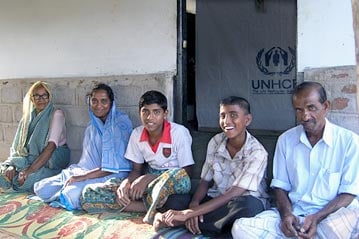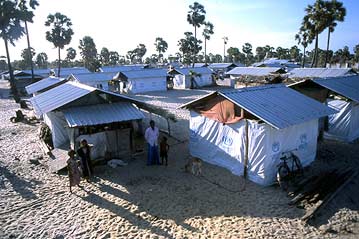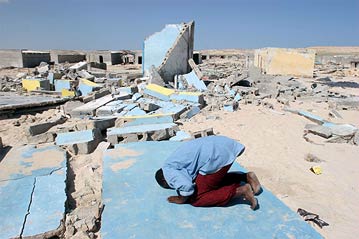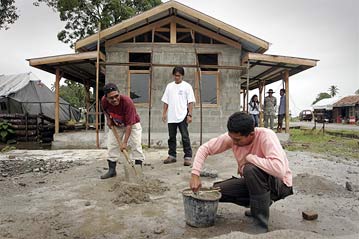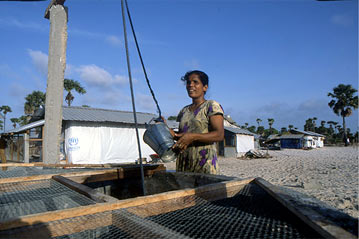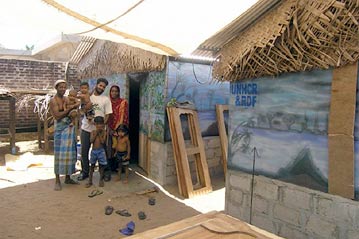Tsunami response latest
Tsunami response latest
Indonesia: UNHCR's relief shelter programme in the Indonesian province of Aceh is rapidly moving into top gear after the Swiss Super Puma helicopters started flying tents and kitchen sets into affected areas on the west coast on Monday. The three helicopters will be airlifting materials on a Medan-Meulaboh-Calang-Banda Aceh-Medan rotation. UNHCR has nearly all its relief supplies split between Medan and Banda Aceh, and a final truck convoy from Jakarta to Medan left today to move the last of the more than 400 tonnes of relief items airlifted into Indonesia from our central and regional warehouses in Copenhagen and Dubai.
UNHCR's large lightweight tents, which can accommodate 10 people, are now being set up in Banda Aceh and in Meulaboh, providing a better standard of accommodation and some privacy for the homeless. We are in the process of setting up an emergency shelter camp for some 1,000 displaced people in Meulaboh - some who had previously been living in squalid conditions with no sanitation or water, and others living in government or school buildings. This temporary shelter will be run by the local, civilian authorities.
We want to be clear that UNHCR's policy is to get people back into their own homes or into new homes as quickly as possible. We are aiming at starting recovery and reconstruction almost simultaneously with the provision of emergency relief so we can reduce as much as possible the time displaced people have to live in temporary camps. We have brought physical planning experts to Banda Aceh to help with this effort, which will include helping people rebuilding their damaged or destroyed homes, or help them build a home in a new location if they don't wish to return to their previous property. Many displaced people have expressed a preference for living with host families, and UNHCR will be taking this into account in its shelter strategy.
We were asked by the Indonesian public works ministry for our input on the ministry's plans to establish 24 temporary accommodation centres around Aceh for 30,000 people. The ministry fully accepted our proposals concerning changes in the design of the centres, conforming to UNHCR's standards for refugees and displaced people. But we want to emphasise that UNHCR will not be administering these centres, and our shelter efforts are directed entirely at getting people back into their own homes.
Elsewhere in Aceh, this morning a ship arrived in the devastated town of Calang from Banda Aceh carrying UNHCR relief supplies including 250 tents, 2,000 blankets, 400 plastic sheets, 20 plastic rolls and 400 kitchen sets and 400 jerry cans.
Sri Lanka: Assistant High Commissioner Kamel Morjane arrived in Sri Lanka this morning with the director of UNHCR's Department of International Protection, Erika Feller, and the Director of the Bureau for Asia and Pacific, Janet Lim. They are scheduled to meet high-level government officials and the UN country team in Colombo. On Wednesday, they plan to travel to the south, east and north to visit people displaced by the tsunami and the conflict, and meet with local officials as well as the LTTE.
Three portable warehouses were flown over the weekend to Batticaloa, Ampara and Trincomalee by Sri Lankan Air Force helicopters. They will be erected shortly to store non-food relief items from UNHCR, other UN agencies and NGOs. Two other warehouses will go north to Kilinochchi and south to Matara.
Some 7,500 tents are being sent to Sri Lanka from our stockpile in Amman, Jordan, to help with shelter needs. Today, a four-sortie airlift starts from Amman of 2,000 tents. The remaining 5,500 tents are scheduled to come by sea.
UNHCR has completed distributions across all temporary accommodation centres in Kilinochchi and Mullaitivu. It is now planning to distribute non-food relief items to new arrivals at the centres.
In Batticaloa, UNHCR staff have been talking to displaced people in temporary accommodation centres to find out what their specific needs are and to reflect them in discussions with local authorities.
Since Dec 26, the day of the tsunami, UNHCR has distributed shelter and non-food relief items to more than 135,000 displaced people in Sri Lanka. This includes more than 22,600 pieces of plastic sheeting, close to 30,000 mosquito nets, more than 10,000 kitchen sets and over 15,000 items of clothing.
Somalia: We have dispatched a ship carrying UNHCR blankets and plastic sheeting to Somalia, which was also hit by the tsunami. The ship should reach the port of Bossasso, in north-east Somalia ("Puntland"), on Thursday. Two more ships are set to sail from the Kenyan port of Mombasa within the next few days, and will bring UNHCR's total contribution to tsunami survivors in Somalia to 32,500 blankets, 10,000 plastic sheets, 15,000 kitchen sets, 10,000 jerry cans and 30,000 sleeping mats. We have also sent extra international staff to Puntland from Nairobi to help in the distribution of these items.

